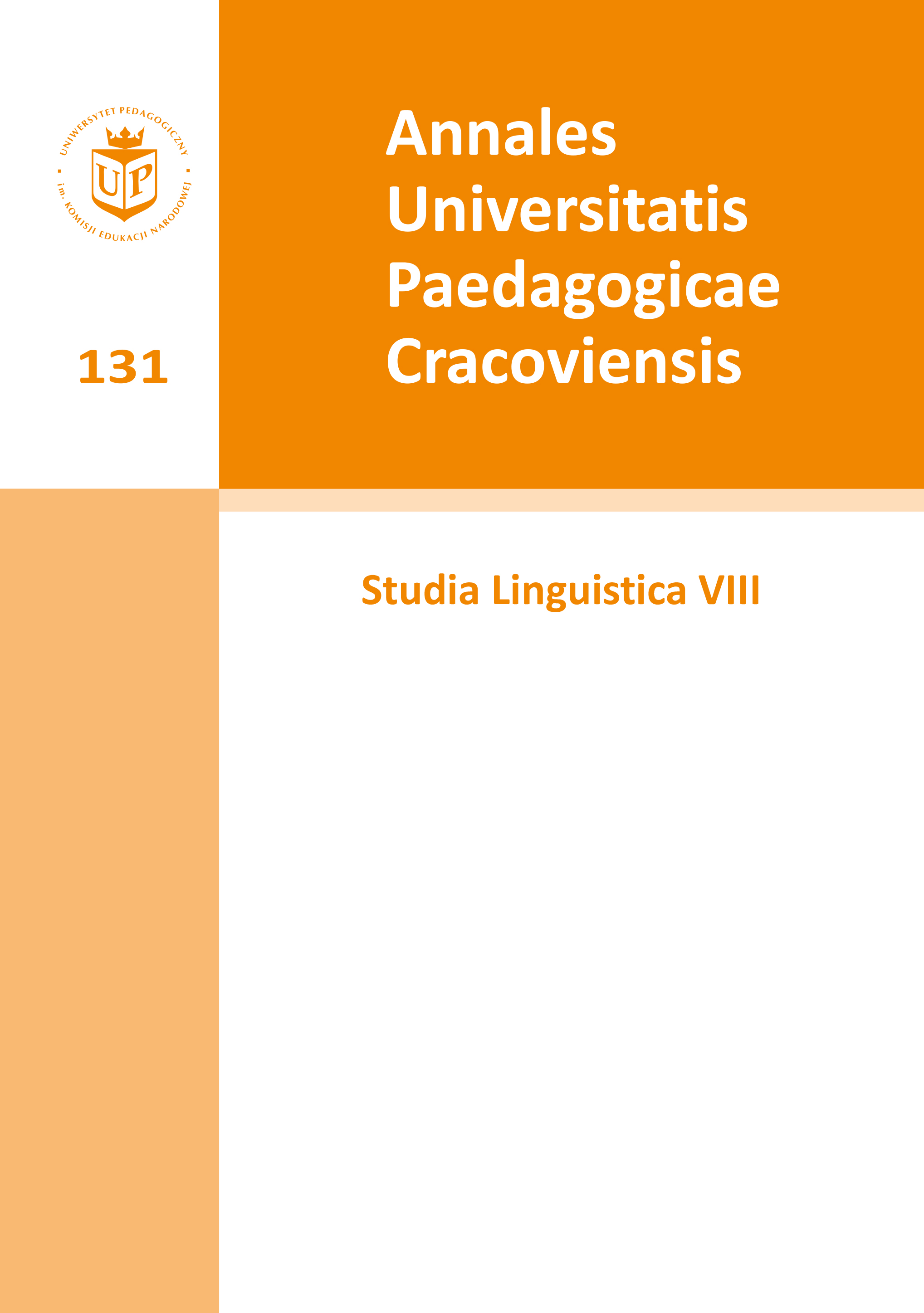O paradygmacie polskiego imperatywu
Main Article Content
Abstract
The article deals with the status of the Polish hortative forms with niech and their relationship to the imperative. Particular attention is paid to the 1st person forms, which are “interpretive” in the sense given to this term by Sperber and Wilson, viz. they echoically refer to directive speech acts issued by persons other than the speaker. The notion of interpretive hortative expressions provides an explanation to the position of the 1st person forms in the imperative paradigm as well as to distinctions between exclusive and inclusive 1 st person plural imperative forms.
Downloads
Article Details
Author, submitting a text to the editorial board of the journal “Annales Universitatis Paedagogicae Cracoviensis. Studia Linguistica", certifies that the content of the article has not been published so far and that the work does not violate in any way the copyright or related rights of other person, as well as other rights of third parties, and that no one's rights to the work (or any part thereof) have been missed. After signing the contract, the property rights to the published materials are transferred to the Scientific Publisher of the University of the National Education Commission, Krakow.
“Annales Universitatis Paedagogicae Cracoviensis. Studia Linguistica” is an open access journal, and all its content is made available free of charge to users and institutions under the Creative Commons CC-BY-NC-ND 4.0 license (attribution, non-commercial use, no derivative works). Under this license, the authors agree that their work may be lawfully reused for any purpose, except for commercial purposes, without the prior consent of the author or publisher. Everyone can read, download, copy, print, distribute and process these works, provided that the author's marking and the original publication place are correct. Published texts may not be used to create derivative works (e.g. to translate and publish in another language without the consent of the publisher). This is in line with the BOAI (Budapest Open Access Initiative) definition. "Studia Linguistica" does not charge for submitting or processing articles.
References
ChST = Vetus Testamentum Lithuanica lingua donatum a Samuelo Boguslao Chylinski una cum texto belgico, red. G. Kavaliūnaitė, Vilna 2007.
Google Scholar
Croft W., 2003, Typology and Universals, wyd. 2, Cambridge.
Google Scholar
Gesenius F., Kautsch E., 1909, Gesenius’ Hebrew Grammar as Edited and Enlarged by the Late E. Kautsch, wyd. 2, Oxford.
Google Scholar
Grzegorczykowa R., Laskowski R., Wróbel H. (red.), 1984, Gramatyka współczesnego języka polskiego. Morfologia, Warszawa.
Google Scholar
Holvoet A., 2011, O leksykalnych wykładnikach użycia interpretatywnego, „Linguistica Copernicana”, t. 1, nr 5, s. 77–91.
Google Scholar
Holvoet A., Konickaja J., 2011, Interpretive Deontics. A Definition and a Semantic Map Based Mainly on Slavonic and Baltic Data, „Acta Linguistica Hafniensia”, t. 43, nr 1, s. 1–20.
Google Scholar
Palmer F., 1986, Mood and Modality, Cambridge.
Google Scholar
Sperber D., Wilson D., 1986, Relevance. Communication and Cognition, Cambridge, MA.
Google Scholar
Szober S., 1953, Gramatyka języka polskiego, oprac. Witold Doroszewski, wyd. 3, Warszawa.
Google Scholar
Topolińska Z., 1964, O kategoriach gramatycznych polskiego imperatiwu, „Język Polski”, t. 66, nr 3, s. 167–173.
Google Scholar
Auwera van der J., Dobrushina N., Goussev V., 2004, A Semantic Map for Imperatives-Hortatives, [w:] Contrastive Analysis in Language. Identifying Linguistic Units of Comparison, red. D. Willems, B. Defrancq, T. Colleman, D. Noël, Basingstoke, s. 44–66.
Google Scholar
